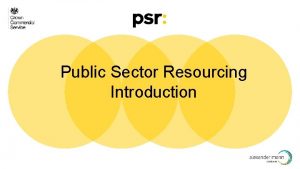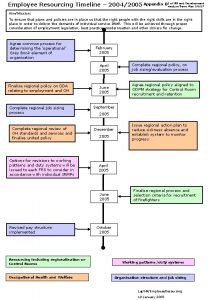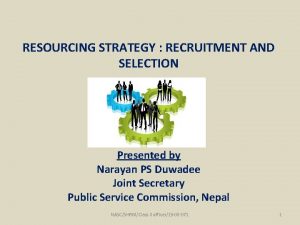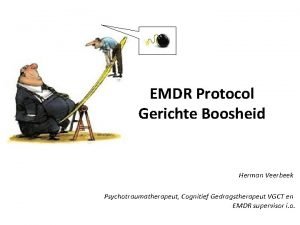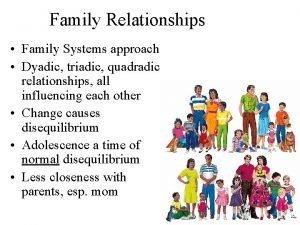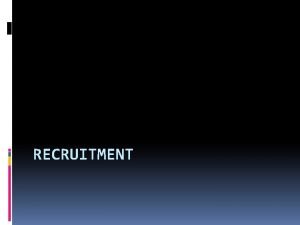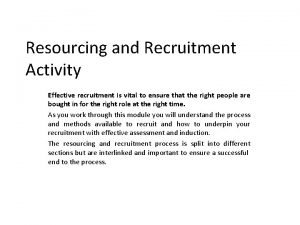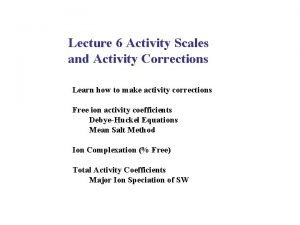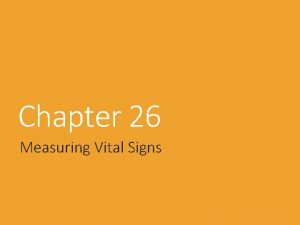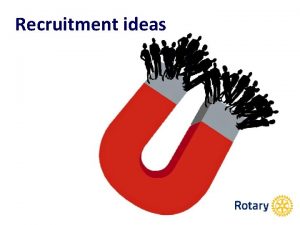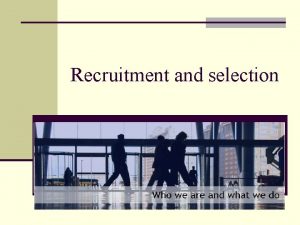Resourcing and Recruitment Activity Effective recruitment is vital









- Slides: 9

Resourcing and Recruitment Activity Effective recruitment is vital to ensure that the right people are bought in for the right role at the right time. As you work through this module you will understand the process and methods available to recruit and how to underpin your recruitment with effective assessment and induction. The resourcing and recruitment process is split into different sections but are interlinked and important to ensure a successful end to the process.

The Components of recruitment • Resourcing decision – What capacity needs to be filled following the identification of a vacancy or a new need across the service. This should always be done at the beginning of the recruitment process • Attraction – what are the best ways to get the best candidate for the post, where is your target market ? • Assessment – what assessment process will you use to make sure you appoint the right person, with the right skills or values to do the job • Appointment – It is important not to cut corners at this end of the process • Induction – The first impression is important to a new starter , a warm welcome and clear direction is key to enable the best performance from the new employee. • Review - ensure your new employees are confident in their role

Resourcing Decision Prior to starting the recruitment process it is important to understand what capacity you need to fill. By asking certain questions you can determine what capacity you need to fill. Q 1. Has the role changed ? If so how ? As the service changed and developed; roles can expand or become obsolete, making way for new duties that need attention. Understand what tasks the person who was previously working in the position carried out and ensure that the JDPS reflects the new requirements accurately. Q 2. What sort of contract do you want to offer. This can be permanent, fixed term, temporary, full time , part time, training contract, Apprenticeship or agency worker Q 3. Is this a new post, if so you will need to create a Job Description and person specification/ role profile. If this is a new post and dependant on the grade, you may want to recruit an Apprentice or trainee in the first instance and then move them into a substantive post. Q 4. If the role is the same as previously carried out, You will need to have a JDPS and advert text Q 5. By taking time to understand the service needs you may save money or be able to offer a development to an existing member of staff.

Attraction • • Type of recruiting – Internal or External of the organisation Advertising method - There are many ways to advertise roles, This will depend on where your target market is. • The provider supportal facilitates free advertising on the Hoople site, the Care Heroes site and the Adult wellbeing pages on the council site • Hoople recruitment Advisors can also assist you with different mediums if required. • Word of mouth is a very powerful way to recruit within the social care sector, your staff are your ambassadors you can even offer benefits to staff who recommend • Specialist recruitment agencies e. g. ACT, • tabloid press, • local notices in shops and other community based locations • Bill boards and on buses. • Bringing volunteers in to try the job Length of time for advert - This will depend on the advertising method and can be any thing from 1 to 6 weeks, beyond this may have a detrimental affect on the reputation of the organisation. • CV or application form – Both can be used but it is often easier to get the specific knowledge you require by designing and using an application form • Advert – When you write the job advert it is important to sell the role, identify some key specific tasks and the benefits the candidates can expect from the organisation and the role. Within the care sector there is a push to consider value based recruitment see the link for more information. http: //www. skillsforcare. org. uk/Recruitment-retention/Values-based-recruitment-andretention/Recruiting-for-values-and-behaviours-in-socialcare. aspx? gclid=EAIa. IQob. Ch. MI 8 MD 9 lcq. O 1 w. IVBo 0 b. Ch 0 c 8 g. Sb. EAAYASAAEg. Ksw_D_Bw. E •

Shortlisting Effective shortlisting is important for a number of reasons; • fair comparison between candidates against the job description and person specification if you carry out a competitive process • Shortlisting will consider the candidates against the shortlisting requirements • Identifies the appropriate candidates to assess/ interview and so save time in the long run • Shortlisting records assist with feedback if requested • Actual physical notes if faced by a challenge from an applicant, to confirm why they were not appointable • It gives the manager the opportunity to read thoroughly through the application or CV and to discuss with others or to establish the merits and the shortfalls of the candidates. • It is important to establish appropriate people to carry out shortlisting, it is usually the same people who will be doing the assessment process. This will show professionalism and an interest in the applicants.

Assessment • • • Decision on the techniques to be used for the assessment should be based on the values, skills, behaviours and knowledge that needs to be demonstrated for the role Some members of the interview panel should have been part of the shortlisting panel to allow continuity of the process and if possible have experience of safer recruitment processes. The choice of assessment process will be dependant on the type of job, it would be different for a care worker and a registered manager. Interview Panels or individual - this is the opportunity to pose specific questions and scenarios to the candidate and measure against an expected answer. There are certain questions that should not be asked as they may bias the results of the interview and would contravene some of the acts and regulations around employment ; these include specific questions about sickness, childcare for example. This is suitable for all levels of staff. Psychometrics - is a technique of psychological measurement and includes the objective measurement of skills and knowledge, abilities, attitudes, personality traits, and educational achievement. This would be ideal for a Level 5 workers including managers and commissioners Presentation – This will enable the candidate to show their presentation skills and also the knowledge around the subject area. Suitable for roles that required public speaking e. g. trainer or Senior manager Group exercise – This exercise will show the candidate works as a leader , team member, understands the subject area in relation to the organization and the customers, and personal behavior dependent on the length of the exercise. This type of activity is good to test peoples ability to work on their own initiative and can be pitched at different levels dependent on the scenario set. I 21 scenario/ role play – this can demonstrate people management behavior, communication skills and people management knowledge. This would work well for all roles from a care worker to a manager Written exercise – can demonstrate writing skills and knowledge of a subject area. This is a good method if reports or notes are required as part of the role.

Appointment • Prior to appointing a person into a post you are required to carry out a DBS check and gather references. There are very few roles across the Social care sector that do not require a DBS clearance. Although this may hold up the recruitment process it will save you having to complete a risk assessment and in the worst case scenario have to finish the staff member because of an inappropriate positive DBS or a bad reference. • Professional registrations e. g. nurses, also need to be checked at this point although it is the applicants responsibility to keep this up to date. • It is important that when the new starter arrives on their first day they have a structured Induction and they are made to feel welcome. • All appropriate training needs to be completed prior to working unsupervised and appropriate Personal Protective Equipment has been issued or purchased

Induction This is the most important time in the recruitment process, but is often not carried out in a positive and robust way. The workers first experience of the service, is the one that will stay with them and will affect their judgment going forward. It is important to ; 1. Plan the induction activity and ensure that the manager is introduced to the new worker even if they are not carrying out the induction. This will show the new starter that they are valued from the beginning. 2. Explain the induction activity planned for the new starter and introduce them to the various people they will be working with. This will allow time for the worker to think of questions in advance. 3. Confirm the Terms and Conditions the worker will be employed under identifying pay rates, travel payments any benefits they will be entitled to. Clarity and transparency will be key here. 4. Identify a job buddy for the new starter so the new starter has a person they can go to. 5. Issue equipment and uniforms as appropriate 6. Ensure appropriate risk assessments are completed and signed off and policies ready and understood 7. Explain the development activity set out to ensure that the new starter understands the work involved with the mandatory Care Certificate training or Apprentice training. 8. Ask the new starter if they have any specific queries or worries about the role, if questions are asked answer them and take note, these queries can be checked again at the review session 9. Plan a date for the initial one to one session 10. Collect relevant certificates and other personal information and input into the NMDS - SC

REVIEW It is good practice to review the work of the new starter, this will prevent them leaving prematurely • • • A one to one session should be carried out to understand how the worker is getting on If there are issues, set up a plan to work with the worker to rectify them Set up regular 121 meetings Plan a training development plan for the next 6 months, this can be a mixture of shadowing different experiences and with experienced care staff as well as undertaking structured development. Ensure that any financial payback promised ( uniform or DBS ) at the beginning of employment is honoured this can sometime get forgotten, the worker will not forget but may not feel confident to ask for it.
